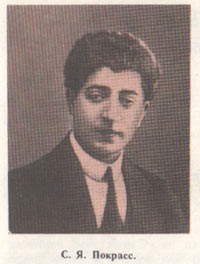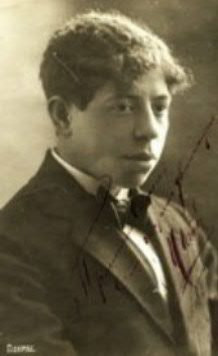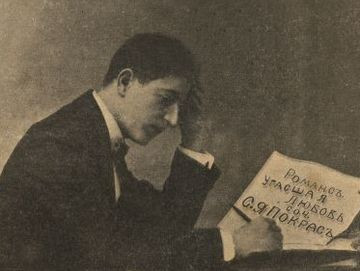Самуил Покрасс
Настоящее имя: Самуил Покрасс
Об исполнителе:
Samuel Pokrass (1897–1939), also known as Sam Pokrass, was a Soviet and American composer, pianist, brother of Arkady, Dmitry, and Daniel Pokrass. He enrolled in the Kiev Musical College in 1907 to study violin and piano. Samuel became well-known as a virtuoso accompanist at the age of sixteen, and also published his first romance arrangements through Leon Idzikovsky Publishing House. In 1917, Samuel Pokrass graduated from the Petrograd Conservatory and returned to Kiev. He spent most of the Civil War there, performing as a pianist, accompanying Vasily Shumsky, and composing romances in the so-called "intimate" genre. Popular singers like Mikhail Vavich and Vladimir Sabinin performed Pokrass songs, which made the composer famous. In the summer of 1920, a poet Pavel Grigoriev asked Samuel to write music for a couple of his propaganda poems, commissioned by Politprosvet. Pokrass composed a few melodies, one of which happened to turn into a world-famous Red Army Is The Strongest («Красная армия всех сильней») hymn. Dmitry and Daniel convinced Samuel to join them in Moscow, so Pokrass moved in 1923. He quickly gained fame with his outstanding piano improvisations and debuted at the newly opened music hall Aquarium in December 1923. The music hall was closed in March 1924, and at the same time, Bolsheviks agitators were heavily criticizing Samuel Pokrass for his decadent and melancholic style, unfit for the young and energetic Soviet nation. Any music critic would also clearly recognize Jewish folk elements in his music, making the composer an easy target for anti-Semitic attacks. Pokrass soon realized that he had no future in the new Soviet Russia, so during his visit to Germany in 1924, Samuel decided not to return to the USSR. He lived in Berlin for a few years, later in Paris (1927–28), and finally settled in the USA. Back in Russia, musicians and artists in his genre were experiencing more and more pressure from Soviet officials, and during the All-Union Musical Conference (1929) in Leningrad romance was banned as a counter-revolutionary genre. Three Pokrass brothers in USSR suffered from the "close relative in the foreign country." Meanwhile in America, Sam Pokrass became a leader of a jazz orchestra and composed popular music, particularly for Broadway musicals and Hollywood films. The Three Musketeers (1939) by Allan Dwan became very popular in USSR after the WWII as a trophy brought from Europe, and everyone knew the theme song by Pokrass. On the other hand, Samuel was always ostracized by the Russian emigrant community in the USA who despised him as the Red Army hymn author. In 1939, Sam Pokrass was poisoned in New York. He was presumably assassinated by either NKVD agents (as the traitor) or Russian Empire patriots in exile as an act of revenge.



